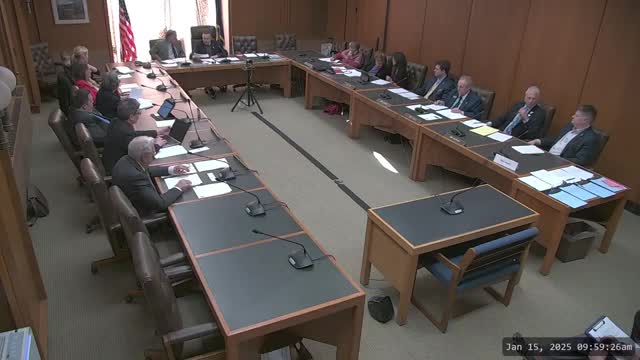Committee Hears HB 113 to Allow OHRVs on Short State Road in Windsor
Get AI-powered insights, summaries, and transcripts
Subscribe
Summary
The House Resources, Recreation and Development Committee opened a hearing on HB 113, a bill that would add a short stretch of state road in the town of Windsor to the list of highways on which off‑highway recreational vehicles may travel.
The House Resources, Recreation and Development Committee opened a hearing on HB 113, a bill that would add a short stretch of state road in the town of Windsor to the list of highways on which off‑highway recreational vehicles (OHRVs) may travel.
Representative Rachea Colcomb, prime sponsor and the legislator for Hillsborough, Windsor, Antrim and Bennington, told the committee the measure is narrowly focused: it would allow local residents who routinely use ATVs and UTVs as primary vehicles to legally cross an 1.8‑mile summer‑maintained segment of state road so they can move between parts of the town without a lengthy detour. “There’s roughly 12 houses… this is for the local use to be able to continue to use their road system,” Colcomb said.
The bill matters because it raises the question of when travel on state‑maintained roads should be opened to OHRVs and, if so, how that change is implemented. Supporters and Windsor officials say the move would recognize long‑standing local practice and reduce travel burdens for residents who lack alternate routes. Opponents warned that changing access on a state road can set a precedent and that existing statutes require public notification and a selectboard request.
From the state’s perspective: David Rodrigue, assistant commissioner for the Department of Transportation, said the department does not take a position for or against the policy but raised process and safety concerns. Rodrigue told the committee the bill as written would “simply make these roads open for OHRV use without the public process that is required by communities when they open class 4, 5 or 6 roads for OHRV use.” He pointed the panel to RSA 215‑A:69, which requires abutter notification, a selectboard request and signage marking where on‑road OHRV use begins and ends. Rodrigue offered two alternatives: require the bill to reference RSA 215‑A:69 procedures or ask the town to request reclassification of the segment from a state‑maintained class 2 road to a class 5 town road.
Local testimony split. Colcomb said Windsor selectmen have permitted OHRV use on town roads and have begun the public‑notice process required under state law; she described Hillsborough police as willing to respond to incidents in Windsor in practice and said she had heard no local complaints. “They’re already traveling on their town roads without complaints or issues,” she said.
Opponents said the statutory process and law‑enforcement capacity matter. Anne Davis, a Wilmette resident who testified representing timberland owners and the New Hampshire Farm Bureau on the state OHRV study commission, asked the committee to defer: she said local notification and law‑enforcement contingencies had not been clearly recorded with the study commission and recommended more vetting before the committee acted. Abby Evanko, clerk of the HB 1188 OHRV Study Commission and a member of the New Hampshire Rail Trails Coalition, urged the committee to send the bill to the study commission for evaluation, citing the trail‑siting standards in RSA 215A:41–43 and telling members she had heard homeowners and summer camps were unaware of proposed changes. “Please ITL HB 113,” Evanko said, arguing the request would be better considered within the commission process.
Other witnesses cautioned about unintended consequences of opening a connector. Claude Pigeon, a study‑commission member and long‑time motorized‑recreation user, warned that connector openings often invite further expansion and can change a “dead‑end” node into a circuit that attracts more traffic.
The committee recorded a blue‑sheet count at the end of the hearing: 3 in favor and 4 opposed. No final committee recommendation or statutory change was reported at the hearing; DOT recommended that any authorization reference RSA 215‑A:69 or that Windsor pursue reclassification so the town process, signing and an ability to close the route later would be available.
What’s next: the sponsor said she would continue to work with Windsor selectmen and the committee on required public‑notice steps; DOT and the study commission recommended following established RSA procedures before authorizing OHRV travel on state roads.
